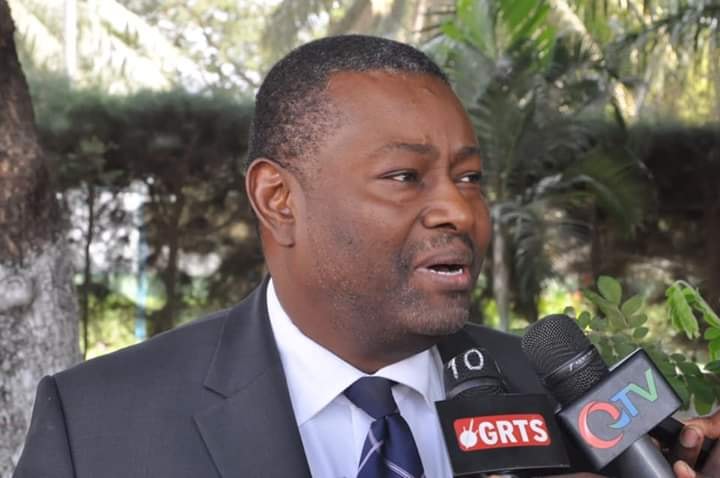By: Haddy Touray
Economist Morro Gaye has said the bill for the increase ofremuneration of judges and judicial officers should be rejected by the National Assembly, arguing that it can have a spillover effect on the other arms of government with devastating economic consequences.
According to Mr. Gaye, the Gambia government is cash-strapped and cannot afford another round of salary enhancement.
“The controversy surrounding the ‘Judicial Officers Remuneration Bill’, which aims to increase the salaries, allowances and pensionable benefits of judicial officers,currently before the National Assembly, should be reviewed within the context of addressing the growing discrepancies within the government integrated pay scale for the executive, the judiciary and the legislature,” stated Mr. Gaye in an interview with this medium.
He explained that President Barrow earns a monthly salary of D255,000 while Vice President Muhammad B.S Jallow earns a monthly salary of D105,397 and a responsibility allowance of D18,750. The House Speaker Fabakary Tombong Jatta, he went on, rakes a monthly salary of D100,000, a responsibility allowance of D30,000, a D20,000 professional allowance, a D10,000 robbing allowance, a telephone allowance of D4,500 and D40,000 for house rent. The Speaker’s salary and benefits, he added, total D204,500. Chief Justice Hassan Bubacarr Jallow, elaborated economist Gaye, receives a monthly salary of D78,488, a responsibility allowance of D41,6667, a professional allowance of D11,500, robbing allowance of D10,000, a D6000 telephone allowance, D28,000, a utility allowance of D10,000 and D4,000 for domestic staff. The chief justice’s benefits and allowances, he explained, amount to D189,655. He pointed out that the deputy speaker Seedy K. Njie receives a monthly salary of D70,000, a responsibility allowance of D25,000 and a D4,500 telephone allowance. The deputy speaker, he pointed out, goes home with D99,500 each month as salary and benefits. Still giving a comparative analysis of the remunerations of the executive, the judiciary and the legislature, Mr. Gaye explained that ministers earn a monthly salary of D65,000, D7,500 responsibility allowance, D3,500 telephone allowance and D5,000 for house rent. He added that legislators receive a monthly salary of D48,414, a D15,000 house rent money, a D31,983 utility allowance and a D50,000 basic car allowance.The salary and benefits of NAMs, he explained, total D145,397. Mr. Gaye said judges earn D58,500 as monthly salary, D40,000 as responsibility allowance, D8,000 as robbing allowance, D4,000 telephone allowance, D15,000 for house rent, D10,000 special allowance, D4000 for domestic staff and D10,000 utility allowance. The judges, he stated, go home with a monthly salary and benefits, totaling D149,500.
According to him, this analysis shows that top highest-paid civil servant in The Gambia is the President with a fixed monthly salary of D255, 000, excluding any allowances.
He further revealed that the President is followed by the Speaker with a gross salary of D204,500.00 per month, adding that the Chief Justice and the Supreme Court Judges are next in line with a gross of D189,655.00 and D149,500,respectively.
“The Members of Parliament earning a total gross of D145, 397.00 is more than the salary and allowances of the Vice President, which is D124, 147.00. This analysis shows thediscrepancies in the renumerations of the three arms of government.
“Judges are paid robing allowance, telephone allowance, responsibility allowance, utilities allowance, house rent allowance even though most of them are staying in their own premises, and interestingly the State is also paying them for domestic maids. To all indications, the allowances paid to these judicial officers are more than adequate and comparable to those that judges in the subregion are getting,” Gaye pointed out.
“Like every other Gambian, this bill that aims to rectify the disparity in the remuneration between the judiciary and comparable officials in the executive branch of government must also include those nurses, teachers, security personnel, drivers, and others providing essential services to the community and are so poorly paid that they cannot even make any savings towards their retirement,” he added.
He contended that increasing remunerations for judicial officers without doing the same for those at the top executive or the legislative could be counterproductive.
“Policies governing pensions and gratuity, health insurance, allowances and other benefits should be applicable to all public officials, especially those at the middle or bottom of the civil service hierarchy and not only limited to judges. What is good for the goose is equally good for the gander,” he concluded.





